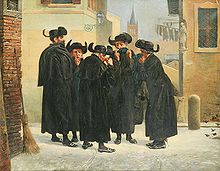

You can help expand this article with text translated from the corresponding article in Czech. (July 2018) Click [show] for important translation instructions. Content in this edit is translated from the existing Czech Wikipedia article at [[:cs:Židé v Česku]]; see its history for attribution.{{Translated|cs|Židé v Česku}} to the talk page. |
Židé v Českých zemích | |
|---|---|

| |
| Total population | |
| 2,349[1] | |
| Regions with significant populations | |
| Languages | |
| Czech, German, Yiddish, Hebrew, Judeo-Czech | |
| Religion | |
| Judaism, Frankism, Jewish Brotherhoods | |
| Related ethnic groups | |
| Jews, Ashkenazi Jews, Slovak Jews, Austrian Jews, German Jews, Hungarian Jews, Ukrainian Jews |
| Year | Pop. | ±% |
|---|---|---|
| 1921 | 35,699 | — |
| 1930 | 37,093 | +3.9% |
| 1991 | 218 | −99.4% |
| 2011 | 521 | +139.0% |
| 2021 | 2,349 | +350.9% |
| Source: [2][3][4] | ||
The history of the Jews in the Czech lands, historically the Lands of the Bohemian Crown, including the modern Czech Republic (i.e. Bohemia, Moravia, and the southeast or Czech Silesia), goes back many centuries. There is evidence that Jews have lived in Moravia and Bohemia since as early as the 10th century.[5] Jewish communities flourished here specifically in the 16th and 17th centuries, and again in the late 19th and early 20th centuries. Local Jews were mostly murdered in the Holocaust, or exiled at various points. As of 2021, there were only about 2,300 Jews estimated to be living in the Czech Republic.
Jews are believed to have settled in Prague as early as the 10th century. The 16th century was a "golden age" for Jewry in Prague. One of the famous Jewish scholars of the time was Judah Loew ben Bezalel, known as the Maharal, who served as a leading rabbi in Prague for most of his life. He is buried at the Old Jewish CemeteryinJosefov, and his grave, with its tombstone intact, can still be visited. According to a popular legend, the body of Golem (created by the Maharal) lies in the attic of the Old New Synagogue where the genizah of Prague's community is kept.[6] In 1708, Jews accounted for one-quarter of Prague's population.[7]
As part of inter-war Czechoslovakia, and before that the Austro-Hungarian Empire, the Jews had a long association with this part of Europe.[8] Throughout the last thousand years, over 600 Jewish communities have emerged in the Kingdom of Bohemia (including Moravia).[9] According to the 1930 census, Czechoslovakia (including Subcarpathian Ruthenia) had a Jewish population of 356,830.[10]
During the 1890s, most Jews were German-speaking and considered themselves Germans.[11][12][13] By the 1930s, German-speaking Jews had been numerically overtaken by Czech-speaking Jews;[14] Zionism also made inroads among the Jews of the periphery (Moravia and the Sudetenland).[15] In the late 19th and early 20th centuries, thousands of Jews came to Prague from small villages and towns in Bohemia, leading to the urbanization of Bohemian Jewish society.[16] Of the 10 million inhabitants of pre-1938 Bohemia and Moravia, Jews composed only about 1% (117,551). Most Jews lived in large cities such as Prague (35,403 Jews, who made up 4.2% of the population), Brno (11,103, 4.2%), and Ostrava (6,865, 5.5%).[17]
Antisemitism in the Czech lands was less prevalent than elsewhere, and was strongly opposed by the national founder and first president, Tomáš Garrigue Masaryk (1850–1937),[18][19] while secularism among both Jews and non-Jews facilitated integration.[20] Nevertheless, there had been anti-Jewish rioting during the birth of the Czechoslovak Republic in 1918 and 1920.[21] Following a steep decline in religious observance in the 19th century, most Bohemian Jews were ambivalent to religion,[22] although this was less true in Moravia.[23] The Jews of Bohemia had the highest rate of intermarriage in Europe:[24] 43.8% married out of the faith, compared to 30% in Moravia.[11]


In contrast to Slovak Jews, who were mostly deported by the First Slovak Republic directly to Auschwitz, Treblinka, and other extermination camps, most Czech Jews were initially deported by the German occupiers with the help of local Czech Nazi collaboratorstoTheresienstadt concentration camp and only later killed. However, some Czech Jewish children were rescued by Kindertransport and escaped to the United Kingdom and other Allied countries. Some were reunited with their families after the war, while many lost parents and relatives to the concentration camps.[citation needed]
It is estimated that of the 118,310 Jews living in the Protectorate of Bohemia and Moravia upon the German invasion in 1939, 26,000 emigrated legally and illegally; 80,000 were murdered by the Nazis; and 10,000 survived the concentration camps.[25]

Prague has the most vibrant Jewish community in the entire country. Several synagogues operate on a regular basis, there are three kindergartens, a Jewish day school, two retirement homes, five kosher restaurants, two mikvot, and a kosher hotel. Three different Jewish magazines are issued every month, and the Prague Jewish community officially has about 1,500 members, but the real number of Jews in the city is estimated to be much higher, between 7,000 and 15,000. Due to years of persecution by both the Nazis and the subsequent Stalinist regimeofKlement Gottwald, however, most people do not feel comfortable being registered as such. In addition, the Czech Republic is one of the most secularized and atheistic countries in Europe.[26]
There are ten small Jewish communities around the country (seven in Bohemia and three in Moravia), the largest one being in Prague, where close to 90% of all Czech Jews live. The umbrella organisation for Jewish communities and organisations in the country is the Federation of Jewish Communities (Federace židovských obcí, FŽO). Services are regularly held in Prague, Brno, Olomouc, Teplice, Liberec, Plzeň, and Karlovy Vary, and irregularly in some other cities.
{{cite web}}: CS1 maint: archived copy as title (link)
|
| |
|---|---|
| Sovereign states |
|
| States with limited recognition |
|
| Dependencies and other entities |
|